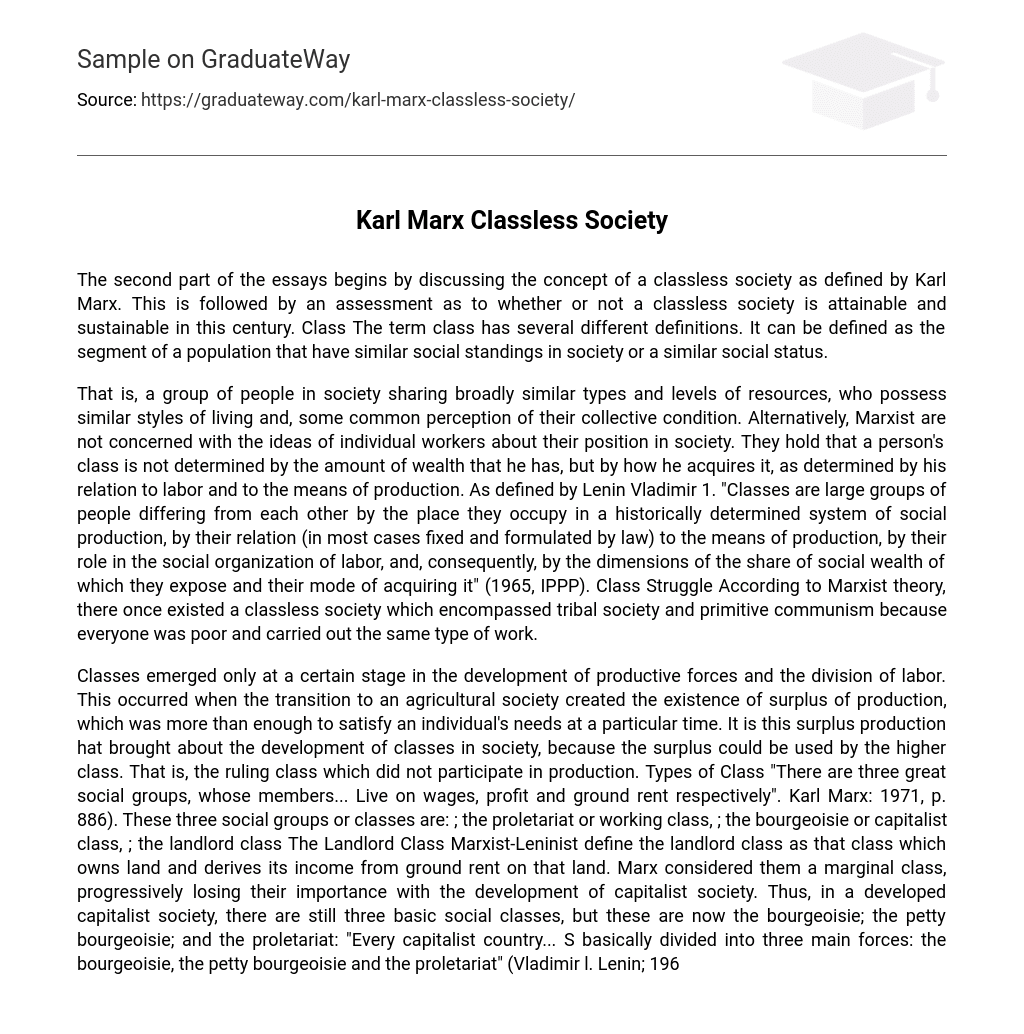In the second part of the essays, the concept of a classless society according to Karl Marx is discussed. Afterwards, an evaluation is made on whether a classless society can be achieved and maintained in this century. Class, which can be defined as a group of people with similar social standings or social status, is also examined.
A class is a group of people in society who share similar resources, lifestyles, and perceptions of their collective condition. Marxist thinkers focus on the collective class rather than individual workers’ perspectives on their societal position. They argue that a person’s class is determined by their relationship to labor and the means of production, rather than solely by their wealth. Lenin Vladimir defined classes as large groups characterized by their role in a historically determined social production system, legal relation to the means of production, involvement in the organization of labor, and acquisition of social wealth. According to Marxist theory, there was once a classless society that encompassed tribal society and primitive communism where everyone engaged in similar work while being equally impoverished.
The emergence of classes occurred during the development of productive forces and division of labor. This happened when transitioning to an agricultural society created a surplus of production that exceeded individual needs. The surplus led to the rise of classes, as it could be utilized by the ruling class, which did not participate in production.
Karl Marx identified three social groups or classes: the proletariat or working class, the bourgeoisie or capitalist class, and the landlord class. The landlord class owns land and earns income from ground rent. However, Marx saw them as a marginal class with diminishing importance in capitalist society.
In developed capitalist societies, the main social classes now include the bourgeoisie (the owners of capital), petty bourgeoisie, and proletariat. The bourgeoisie exploits labor power and accumulates wealth using capital. According to Marxist-Leninist theorists, they are modern capitalists who own means of production and employ wage labor.
The concept of classlessness can be applied to different social situations such as societies without classes or those intentionally abolishing classes like Israeli kibbutz’s. Class analysis helps elucidate how capitalist society functions and addresses various issues raised by alternative approaches.
Critics argue that class analysis gives too much importance to economic factors and does not adequately consider social mobility and changes in contemporary societies. They assert that people from various social backgrounds can benefit from the constantly changing capitalist economy. Moreover, opponents emphasize that class analysis frequently overlooks other forms of social stratification, including those influenced by gender, race, and ethnicity.
In a classless society, private ownership and control over property are absent. This means that classes formed based on property division are eliminated through public ownership of the means of production. As a result, all value generated by labor, including surplus value, is consumed collectively by the community. However, considering Marx’s theory on class and classless societies and recent events, it can be inferred that achieving and sustaining a classless society is improbable.
Many of Karl Marx’s assumptions and predictions have been proven wrong by time and history. One such example is the division of capitalist ownership and control of production. The majority of joint stock companies, which form a significant part of the industrial sector, are now predominantly managed by individuals who do not own capital. Moreover, certain societies have individuals who serve as both employees and shareholders in the company they are employed by. Consequently, it becomes unlikely for a revolution against capitalists to transpire as the worker simultaneously assumes the role of a capitalist.
It would be illogical for an individual to overthrow themselves. Workers are divided and categorized into various skill groups, and they have not become homogeneous. Consequently, initiating a revolution becomes exceedingly challenging for the proletariat, since each worker or skill group possesses distinct objectives and principles. In other words, workers are not unified, and not all may be willing to partake in toppling the capitalist system. Additionally, the emergence of a significant middle class and substantial social mobility has destabilized class structure.
Instead of the widening gap between rich and poor, society has experienced a leveling effect. Additionally, the political influence of the middle class has steadily declined, as worker-focused laws and labor-centric political parties have gained power. Moreover, the rights and privileges associated with owning capital have become more restricted. Of utmost significance, the most intense form of conflict between workers and capitalists, known as strikes, has been formalized through laws governing collective bargaining and strike legality. Furthermore, certain predictions made by Mar about the growth of capitalism have not materialized.
According to Marx, although he recognized capitalism’s ability to adapt and expand, he believed it would ultimately collapse. However, contemporary capitalism has shown resilience by adapting and generating growth through advancements in technology, diverse organizational structures, colonialism and imperialism, and the exploration of new markets. One aspect predicted by Marx is that the introduction of more mechanized industry with increased use of constant capital and decreased use of variable capital would lead to a decline in the rate of profit.





